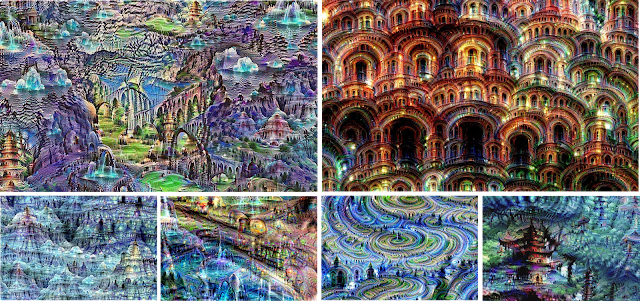About
The Google DeepDream code is an Artificial Intelligence program from Google that generates pictures based on the visualizations of artificial Neural Networks by spotting details in pictures in order to identify them. It has become a trending topic on Twitter, Facebook, Instagram and Reddit.
Origin
On June 17, 2015, Google Research Blog’s post “Inceptionism: Going Deeper into Neural Networks” described that the Neural Network AI could enhance certain features, which distorts the picture, and turns the picture into random-noise images, called Neural network “dreams”[1]. On July 1, 2015, the Google Research blog has made the “DeepDream” code, created by Software Engineers Alexander Mordvintsev, Christopher Olah, and Mike Tyka, available open-source via GitHub[2] and encouraged to share the results along with the hashtag“#deepdream”[3]. There are also websites that use the DeepDream code to modify images[4][5].


Spread
On July 3, 2015, Twitter user “@One_30_One” tweeted a modified version of a poster from the anime series Love Live! using the code (image below, left), with the caption “Oh lord what have I done #deepdream #lovelive @LoveLive_staff”, which got more than 170 retweets and 110 favorites[6]. On the same day, The University of Cambridge posted a picture on Instagram of the chronophage which was also modified using the same code (image below, right) with the caption “We ran the #chronophage through Google’s #deepdream algorithm. Is it the first photo to become less surreal after conversion? #CambridgeUniversity #clock” and got over 900 likes[7].


On July 5, 2015, Gizmodo posted an article about the DeepDream, highlighting some tweets with pictures generated from the code[8]. There has been more than 10,000 posts on Twitter with the hashtag “#deepdreams” as of July 2015[9]. It has also become a trending topic on Facebook and Instagram. The subreddit r/deepdreams has over 800 subscribers as of July 2015[10]. Reddit user TheMadStork posted a gif generated using the code on r/creepy and was frontpaged with more than 3000 upvotes and 400 comments[11].
by Ross Goodwin (<a rel="nofollow" target="_blank" href="http://rossgoodwin.com">http://rossgoodwin.com</a>)Notable Examples






Search Interest
References
[1]Research Blog – Inceptionism: Going Deeper into Neural Networks
[2]GitHub – google/deepdream
[3]Research Blog – DeepDream – a code example for visualizing Neural Networks
[4]Psychic VR Lab – Deep Dream web interface
[6]Twitter – Colin on Twitter…
[7]Instagram – University of Cambridge on Instagram…
[8]Gizmodo – Google’s Dream Robot Is Running Wild Across the Internet
[10]Reddit – Dreaming Neural Nets
[11]Reddit – Terrifying GIF made with Google’s Deep Dream code [x/CreativeCoding] : creepy